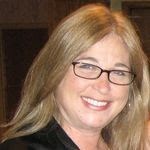I'm may be Fickle, but I'm in Love with a New Man! WSJ's Tom Lauricella.
Tom Lauricella has done it and done it right. He won my heart. The intrepid Wall Street Journal writer interviewed me last week, along with several of the Gen Plus jobseekers (some from my group on Eons) and has written a terrific article, entitled, "How Old Are You? As Old As Your Skills" focusing on the challenges of 50 plus jobseekers looking to secure employment in the face of ageism. (Of course it delights me to be included in the article, too!)
You can click on the link or just read on for the full article. And, by the way, women are notorious for NOT reading the Wall Street Journal, but if you are a man or a woman seeking employment, OR and employer trying to understand what the heck is going on in the US and around the world, following the news in WSJ is a must.
How Old Are You? As Old as Your Skills.
By TOM LAURICELLA
September 16, 2007
Looking for a job is rarely an easy task. Sending out résumé after résumé and grappling with uncertainty and rejection can be a frustrating experience. Older workers, in particular, can encounter age discrimination, even if it's not explicit.
But there are ways to handle this challenge, including thinking differently about how a résumé is prepared -- and simply being prepared for the question, "How old are you?" Plenty of resources -- some free, some for a minimal cost -- are designed specifically for older job hunters.
There is evidence that bias against older adults in the job market, while difficult to prove, does exist. The average hunt for employment took nearly seven weeks longer for job seekers age 55 and older than for individuals younger than 55, according to a 2005 AARP report. That same year, a study by the Center for Retirement Research at Boston College found that in Massachusetts and Florida, a younger worker sending in a résumé was 40% more likely to be called for an interview than someone age 50 or older.
"There continue to be the same stereotypes about older workers, such as they're not willing to try new things and don't have the experience with technology," says Deborah Russell, director of work-force issues at AARP, the large Washington-based advocacy group for older adults.
The bias can be subtle. Pam Taylor, 60, has years of experience in the hotel industry. While applying for one opening recently, she was asked by the interviewer if it would bother her to have "young people" in positions above her.
"That was an age-related question," the Ohio resident says. She adds: "I never heard back from them."
Plenty of Resources
The good news is that there are resources to help older workers with their job search and to help them be ready for age-related concerns from potential employers. AARP helps individual job seekers with their résumé skills at no charge and annually publishes a list of employers that, according to AARP, are most friendly toward workers over 50 when it comes to recruiting practices, opportunities for training and options such as flexible scheduling. (Information is available at aarp.org/careers.)
The Career Advice page for employment Web site Monster.com features a link to a section called "Careers at 50+" which includes a helpful article on résumé tips for older job seekers.
Gen Plus, a blog for the 50-plus set (genplus.blogspot.com), offers a good discussion of issues facing older workers.
Another option in several cities around the country is the chapters of 40Plus, a nonprofit group that offers, among other services, job-hunting seminars and office space that people looking for work can use as a base. The Washington, D.C., chapter, for instance, offers a two-week job training seminar that includes video-taped mock interviews. This course costs $595.
The Web site for the D.C. chapter (40plus-dc.org) has more information about its programs as well as links to chapters in other parts of the country.
Rethink That Résumé
Among the first steps is to rethink the presentation of a résumé. Instinct often tells you to put everything on a résumé -- probably a holdover from your days as a younger job hunter, when your background might have seemed a bit thin. Instead, focus a résumé on relevant work experience -- the more recent the better.
If there's something to highlight but it's from a job 20 or 30 years ago, add it to the résumé under a heading such as "additional skills," without specific dates. AARP suggests a résumé that focuses on "what you can do and how you can do it, rather than on when you did it and for whom."
Still, take the time to make an inventory of accomplishments over the course of an entire job history. David Powell, a 56-year-old Washington, D.C., resident with a background in television documentaries, went back and discovered that there were awards that he had won that he had simply forgotten about. "There's a lot of stuff that I found that's pretty marketable," he says.
Interview Anxiety
For many older workers, the real challenge is sitting down for an interview across the desk from somebody who may be 20 years their junior. It's important to be prepared for the uncomfortable questions, including your age, a question that companies are allowed to ask. "It may be improper but it's not illegal," Ms. Russell of AARP notes.
Don't dodge the question. Rather, state your age -- but make it clear you can handle the job you're applying for.
Barbara Moldauer, who is in her 50s and today has a job working for a federal government agency in Washington, has been asked what year she graduated from college -- a date she purposely doesn't list on her résumé, to help her get a foot in the door.
"I just answer," she says. "If you're good at what you do, there are positions for you."
Wendy Spiegel, who operates the Gen Plus blog, suggests focusing efforts on certain industries that tend to be more friendly toward older workers, even if it's not the industry in which job seekers had spent their careers. For example, she suggests health care and finance and even homeland security. "You might think there is a bias in the finance industry toward younger workers, but the reality is that brick-and-mortar locations [such as bank branches] can't find managers," she says.
Added Challenges
Some aspects of aging can require extra effort to overcome.
Debbie Lincoln, of Little Rock, Ark., is 55 years old and suffers from arthritis -- but she says in her last job she never missed a day of work because of the problem. Still, she knows just the appearance of straining to get out of a chair can affect her chances of getting a job.
So, to make things easier for herself, she scouts the location of a company where she has an interview ahead of time. In this way, she can figure out, for example, where she should park to lessen any strain involved in getting to the appointment. Some problems "aren't going to be easy to overcome but you try to work around them," she says.
Of course, there may be times when a company is illegally discriminating against older workers or job seekers.
If it does seem like a company is biased against older workers or job seekers, the U.S. Equal Employment Opportunity Commission outlines what constitutes age discrimination on its Web site, at eeoc.gov/types/age.html.
• Email: encore@wsj.com








2 comments:
Hi Wendy! Congratulations on being quoted! Great advice, by the way!
Thanks, Walter. I'm always delighted when the media shows some interest in the issues that really affect the 50 plus demographic. I would love to see more employers paying attention to this issue -- they are missing out on some dedicated, productive team players.
The good news is that the major papers: Wall Street Journal, NY Times, LA Times have been digging more into the employment challenges faced by Boomers and 50 plussers.
Wendy
Post a Comment